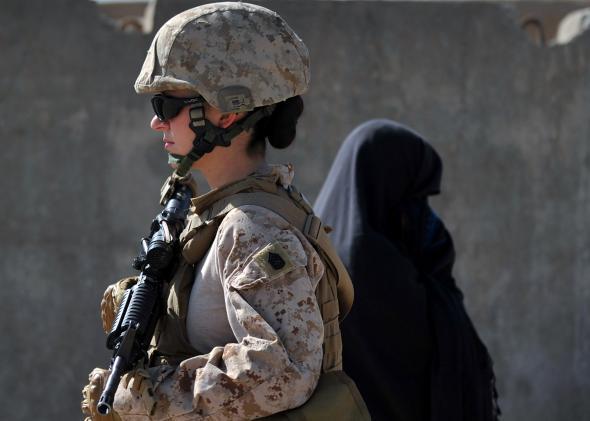In a leaked email published on Politico this week, an Army communications strategist urged the Army’s PR team to feature only “ugly” to “average looking” women in promotional photos. Why? “In general, ugly women are perceived as competent while pretty women are perceived as having used their looks to get ahead,” Col. Lynette Arnhart wrote to two colleagues in public affairs, one of whom forwarded her email on to the whole PR group, along with an approving note. “There is a general tendency to select nice looking women when we select a photo to go with an article (where the article does not reference a specific person),” she continued. “It might behoove us to select more average looking women for our comms strategy. For example, the attached article shows a pretty woman, wearing make-up while on deployed duty. Such photos undermine the rest of the message (and may even make people ask if breaking a nail is considered hazardous duty).”
Ever since January, when then-Defense Secretary Leon Panetta made the decision to open up combat positions to ladies, the hypermasculine military community has struggled to wrap its head around gender integration. Will pretending that physically attractive women never enlist—or that the demanding nature of Army life magically turns beautiful people into nonbeautiful people—help everyone adjust? Arnhart thinks it just might.
I’m not certain gorgeous people are more likely to care about their nails than unremarkable-looking or ugly ones. More to the point, banning all the pretty faces from illustrations of women in uniform seems dishonest and lame—a milder version of demanding that servicewomen bind their breasts or eschew makeup, like in a Tamora Pierce novel.
California Rep. Jackie Speier launched a series of angry tweets in response:
But as correct as her implicit diagnosis of sexism may be (and yes, it is sexist to discriminate against attractive women, since beauty counts as a traditionally “feminine” trait and saying that you can’t be beautiful and capable at the same time basically amounts to suggesting you can’t be feminine and capable at the same time)—is this tactic even scientifically sound?
Studies do show that sexualized women are perceived as less human. In one experiment, men who viewed images of scantily clad ladies had less activation in the brain region associated with social cognition in an MRI. They were seeing the women as objects—and obviously, mindless bodies are deemed less competent than real, thinking people. Furthermore, female CEOs who dress provocatively tend to inspire lower confidence in their abilities than those who dress conservatively. (Interestingly, the effect doesn’t hold for lower-status jobs like secretaries or receptionists.)
On the other hand, those studies focus on sexy weeds, not symmetrical features, great hair, or other inborn physical traits. (While come-hither clothes in the wrong context can incur female wrath as well as male skepticism, the sirens in the Army are presumably wearing standard uniforms.) Multiple papers suggest that physical loveliness correlates positively with estimations of intelligence, happiness and success. In one, a landmark 1974 experiment, male judges declared an attractive female author more talented than an unattractive one, and they rated her essay as better. (It was, of course, the same essay.) This “halo effect,” by which a single good quality leads people to infer the existence of many others, could mean that a female soldier with a goddess-like smile would be more likely to be perceived as an excellent shot than frowny Jane.
Yet more recent research complicates the picture. In 2011, scientists from Hanover College determined that “moderately attractive” women are generally seen as more intelligent than women at either aesthetic extreme. And those deemed truly stunning received lower IQ ratings than those deemed very unattractive. There’s no question that cultural stereotypes about airhead models and dumb hunks inform our sense of the genetically blessed, even if those biases are harder to pin down in a lab. Furthermore, there may be a hidden cause-effect relationship at work: A 2012 study revealed that men may actually find female dim-wittedness hot.
So while Arnhart’s recommendation feels unfair and regressive, it also probably contains some truth. But that doesn’t mean her colleagues should follow it. The Army should instead address gorgeous warrior bias head-on by plastering stories with pictures of Camilla, Britomart, Hippolyta and Lara Croft, tomb raider.
